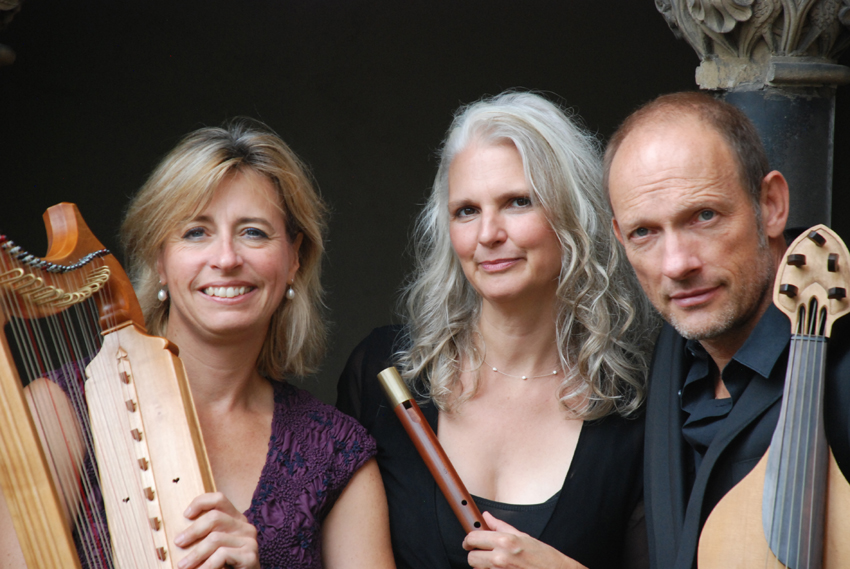Bois de Cologne
Historical harps, recorders, serpent, portative, fiddle and violin, no all-star cast - and a very vital one. Old-time music is not mimicked here, but lived: atmosphere, density without bric-a-brac. At the center of the music itself: music from the Middle Ages, the Renaissance, the early Baroque.
The joy of improvisation and the joy of experimenting characterize the music making of Bois de Cologne: many of the old melodies not only require a careful, source-critical treatment, but also an imaginative interpretation. To empathize with the music of bygone eras and to be inspired by it - these are important aspects of the common work of Bois de Cologne.
The instruments are superb replicas of historical models. The Harp plays, depending on, voice or continuo; the recorders, from the tiny sopranino to the (externally) angular female-high subbass, are air spirits, voices; Tongue art and breath. The fidel, bordun-colored, gently in viola position. Bois de cologne, a wood that bears special fruits.
The ensemble consists of a core that can expand depending on the project. From the duo recorder / harp to the quartet, different constellations are possible. The trio variant with gothic fiddle / violin is particularly specialized in the music of the Middle Ages, the trio with two recorders and harp plays programs from early to high baroque.
Programs
About tears, madness and humor
Video: Lachrimae Pavan von John Dowland
Instrumentation program
Meike Herzig, Recorder
Konstanze Jarczyk, Harp
Albrecht Maurer, Fidel
Ever since music is beeing documented, it has been the composers' attempt to express feelings. This sometimes happens only in a title, but also often through musical metaphors, such as the so-called "sigh motive", used in baroque music as an expression of sadness. In the different epochs there are various variations in the tonal language.
In this programme Bois de Cologne ensemble presents emotional music from five centuries, from the Middle Ages to the Baroque: with recorders, serpent, harps, fiddle, violin and a lovingly painted medieval portative. Guided by the moderation of the musicians, the listener experiences a journey of diverse feelings. Grief, love and sorrow, serenity, quiet and lively devoutness and pure joy of life, all this can be found in the compositions of Mattheis, Dowland, Falconieri, Chedeville, Baltzar and the anonymous works of the Middle Ages.
The varied instrumentation of the diferent pieces, from solo to trio, guarantees a colourful concert with tears, madness and humour...
Heaven on Earth
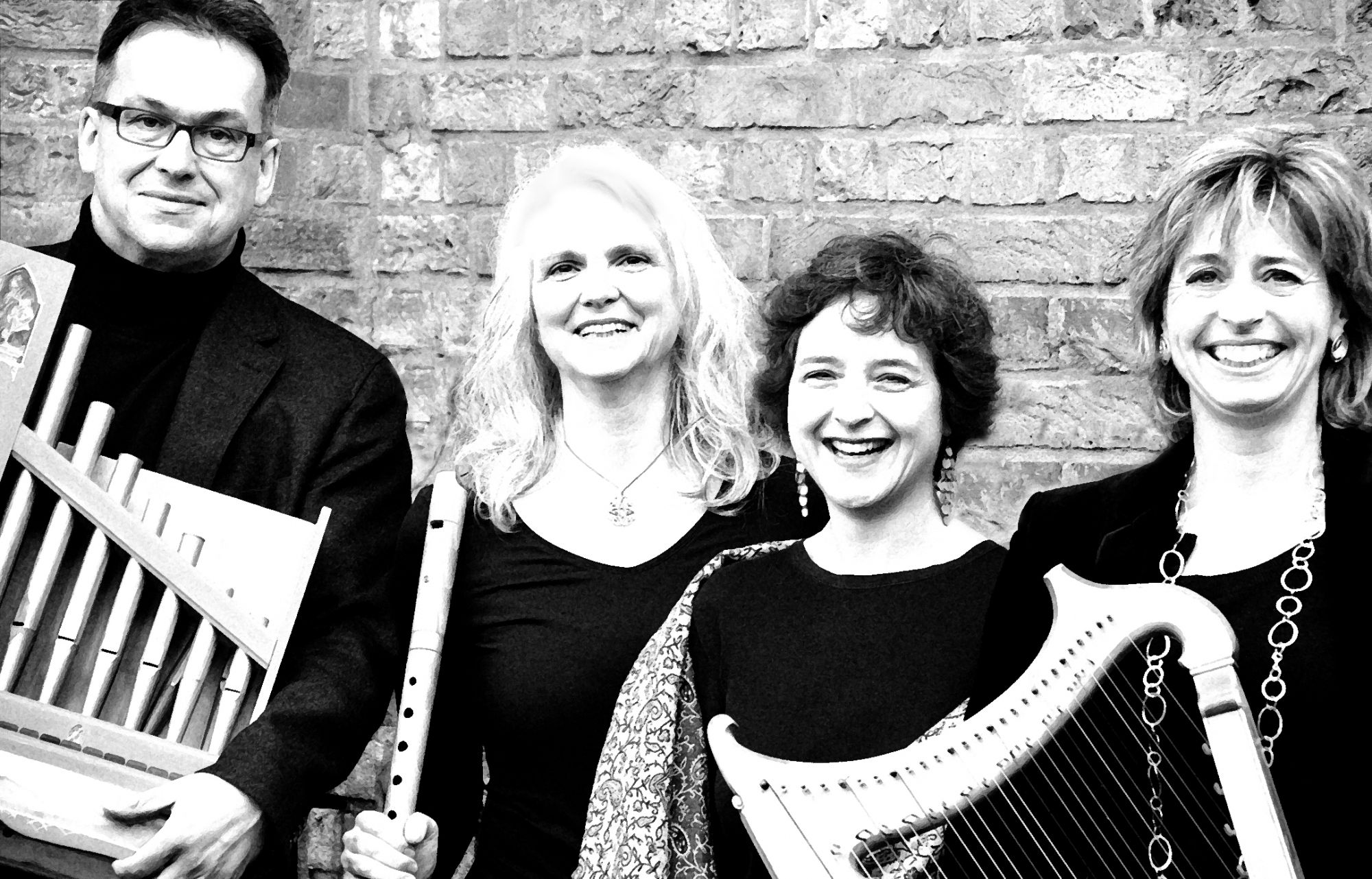
Instrumentation program
Meike Herzig, Recorders
Cora Schmeiser, Soprano
Konstanze Jarczyk, Harp
Stefan Horz, Harpsichord
Already in an Indian writing from the 2nd century it says "The abode of music is heaven" with which music in itself would already be heaven on earth. The program of course explores further facets of the topic: for example the miracles of Mary on earth described in the Cantigas de Santa Maria, a description of heavenly Jerusalem, or in an anonymous Chaconne about the contrast of paradise and hell, and music that does not seem of this world as e.g. by Thomas Preston. Music from the Middle Ages to the Early Baroque, with small excursions into traditional music and improvisation. In short: A heavenly mixture that is not only played but also moderated by the musicians.
Some quotes from a review in the edition of of 9.1.2016 in the "Generalanzeiger":
… a thematically very beautifully arranged program between heaven and earth, which was musically extremely multifaceted.
… also in the numerous baroque pieces of the evening the extraordinary ingenuity of the musicians was evident, regarding both, the instrumentation of the pieces as well as their detailed interpretation.
…altogether... an exquisite program with excellent musicians.
Clips
Douce Memoire (Ortiz)
Scarborough Fair
Se l'aura spira (Frescobaldi)
Time stands still (Dowland)
Stairway to Heaven
Zefiro torna (Monteverdi)
Ensemblemitglieder
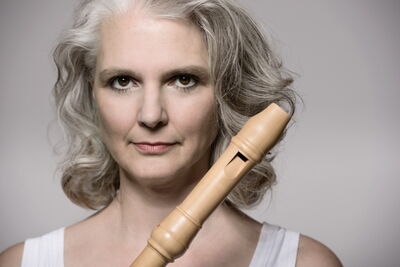
born in 1963, she continued her education intensively after studying the recorder with G. Höller and W. van Hauwe. She was particularly interested in eras and styles that are not usually covered in her studies: the music of the Middle Ages, improvised music and jazz. Her experience with these different genres shapes her style - exciting, rhythmically pointed and tonally differentiated. Concerts with baroque music, for example at the Festival for Early Music in Herne and appearances at the Moers Jazz Festival, the European Broadcasting Union Festival or as first prize winner in the "Creole" competition show the breadth of her artistic work.
Concert tours have taken her to France, Italy, Canada, Hungary, Poland and Switzerland. Meike Herzig plays in the ensembles "Bois de Cologne", "palatino87", "sYn.de" and with artists such as Dorothee Oberlinger, Maria Jonas, Guillemette Laurens, Carlo Rizzo, Michel Godard, Albrecht Maurer, members of Concerto Köln and Sequenzia, the Hilliard Ensemble and as a guest with Ensemble Oni Wytars. Developing unusual, attractive concert and CD programs is one of her particular strengths.
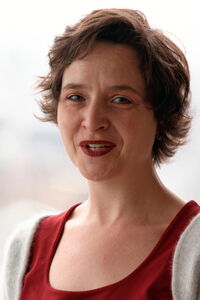
Cora Schmeiser is a versatile singer. Her voice moves smoothly between the music of the Middle Ages, the Baroque and contemporary music. During her performances, she creates an intimate, simple atmosphere in which she captivates the audience with the subtle sound of her voice, with her virtuosity in alternating expressive contrasts and with her subtle facial expressions, dramatic but unaffected.
Cora received her first musical and creative impulses in her parents' house and, through many years of singing in the Rhineland-Palatinate State Youth Choir, experienced the joy of making music together, which led her to her music studies in Frankfurt am Main and The Hague on the Sea. At these places of study, she was able to discover and deepen her interests in old and very old music as well as contemporary music and its theatricality. Through master classes in both areas, such as membership of the Nederlands Vocaal Laboratorium/VocaalLAB, Amsterdam and further training in 'Early Music of the High Orders, Music of the Middle Ages' in Fulda, Cora refined her musical understanding.
Cora is a lecturer in classical singing at the SKVR music school in Rotterdam and works as a language coach for the Great Radio Choir and the Dutch Opera, Amsterdam, among others.
Since its founding in 2004, she has been a permanent member of the Cologne women's choir Ars Choralis Coeln, which performs medieval music by Hildegard von Bingen and Anna von Köln, among others, under the direction of Maria Jonas.
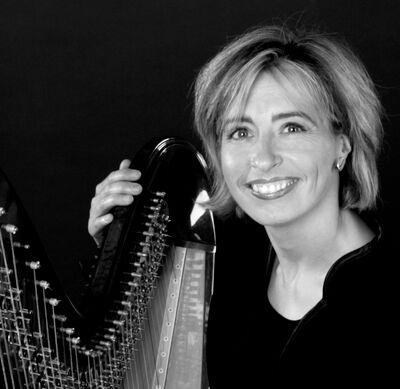
"Konstanze Jarczyk draws incredible emotions from her harp. Many have certainly never heard the harp, which is so often underestimated as a solo instrument, with so much devotion...", wrote the "Badische Neuesten Nachrichen" from Karlsruhe at the start of her 2012 German tour. She took Konstanze Jarczyk to the big stages of Germany, such as the Konzerthaus Berlin, the Laiezhalle Hamburg, the Liederhalle Stuttgart and many others.
"Her broad tonal spectrum from the most delicate silveriness to powerful virtuosity" (Kulturradio Berlin) was demonstrated in solo performances on ZDF, in the cathedral of Barcelona and, last but not least, in the Cologne Cathedral. Chamber music and collaboration with choirs also play a central role in Konstanze Jarczyk's work. This is demonstrated by numerous productions by MDR, BR and WDR.
After studying with Susann McDonald, USA, and during her studies at the Cologne Music Academy with Han An Liu, she became regular guest in the WDR Symphony Orchestra. There she took part in radio and television productions, as well as in concerts, including in Carnegie Hall, New York, in the Musikvereinssaal, Vienna and of course in the Cologne Philharmonic.
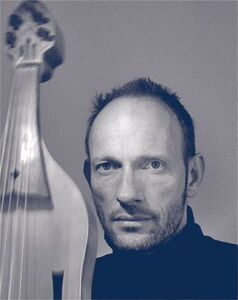
Albrecht Maurer studied violin at the Cologne University of Music and today works as a composer, violinist and, since 2003, as an interpreter of medieval music with Gothic fiddle, rebec and lyrica. He has been a permanent member of Katarina Livljanic's Parisian ensemble Dialogos since 2003. He plays in two Dialogos programs, in Judith and in Barlaam & Josaphat, each in a trio with Katarina Livljanic and Norbert Rodenkirchen.
He has also participated in Norbert Rodenkirchen's projects, e.g. "Aura Christina" with Maria Jonas or "Salon Medival" with Benjamin Bagby, Eric Mentzel and Wolgang Klein Richter.
He has also created two programs with Norbert Rodenkirchen as a duo, Hidden Fresco and Re.Sound, which focus on new music on medieval instruments. Albrecht Maurer has performed with Dialogos in France, Spain, Croatia, England, Italy, Slovenia, Germany, Belgium, Canada and the USA. Highlights were the festivals and concert series in: London Queen Elizabeth Hall (Purcell Room), Cite de la Music Paris, San Sebastian Festival, Split Festival, Zadar Festival, Boston Festival, Barcelona, Rome, Vancouver Early Music, UBC Hall, Lincoln Center New York, Printemps des Art Festival Monaco.
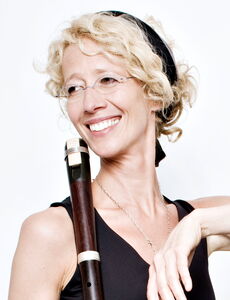
Katharina Hess received her training from Prof. Günther Höller in Cologne and Walter van Hauwe in Amsterdam. With the Flautando Cologne quartet, founded in 1990, she gives concerts at home and abroad (including at the Schleswig Holstein Music Festival, the "International Exhibition of Early Music" in London, the "Porto Series" in Portugal, the "Recorder Festival" in Korea). The recorder player has produced numerous CDs in co-production with WDR. In one of her last CDs with the Flautando Cologne quartet, for example, she shows the musical field between Moorish and Italo-Spanish culture in the Renaissance.
She founded the duo Szücs&Hess with the jazz guitarist Tibor Szücs. Both musicians work in different genres. When they meet, an exciting field of communication arises. Improvisation enables immediate reactions and learning from one another, not only in jazz, but also in early music. For example, the diversity of her program is reflected in her immersion in variations on an old Spanish bass model from the Renaissance, flamenco improvisation, the interpretation of an ancient Transylvanian shepherd's melody and Bartok's adaptation of this folk tune.
Katharina Hess is a scholarship holder of the North Rhine-Westphalia Art and Culture Foundation.
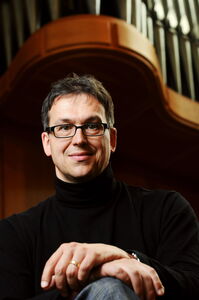
Stefan Horz was born to a married couple of musicians and found his way into music at an early age through improvisation. He studied church music at the Cologne University of Music (A-Exam) and completed an organ course with Prof. Wolfgang Zerer at the University of Music and Performing Arts in Hamburg. Stefan Horz studied harpsichord in Cologne and completed his studies on this instrument after his school leaving examination (“with distinction”) with the concert exam in the class of Prof. Ketil Haugsand. He received important inspiration for his artistic development from master classes with Bob van Asperen, Glenn Wilson, Harald Vogel and Michael Radulescu.
Stefan Horz has performed with various early music orchestras - e.g. Concerto Köln or the Neue Düsseldorfer Hofmusik - and also as a soloist and chamber musician with his own ensembles, including at the Göttingen Handel Festival, the styriarte Festival in Graz, the Rheingau Festival and the Alte Oper Frankfurt.
In 1998, Stefan Horz was appointed as the successor to Johannes Geffert as organist at the traditional Kreuzkirche in Bonn.
One focus of his programs is the performance of the cyclical works of J. S. Bach in a concert, such as all suites and partitas, the Well-Tempered Clavier, the sonatas for harpsichord and solo instruments, the third part of the Clavierübung and the Art of Fugue.
In addition to the concert repertoire for organ and orchestra (Rheinberger, Poulenc), transcriptions from Wagner operas (Lohengrin, Parsifal, Meistersinger, Tristan and Isolde) are at the center of his work. For years, Stefan Horz has performed in a duo with the harpist Konstanze Jarczyk, the jazz saxophonist Roger Hanschel, the bass-baritone Klaus Mertens and the alto Ingeborg Danz.
